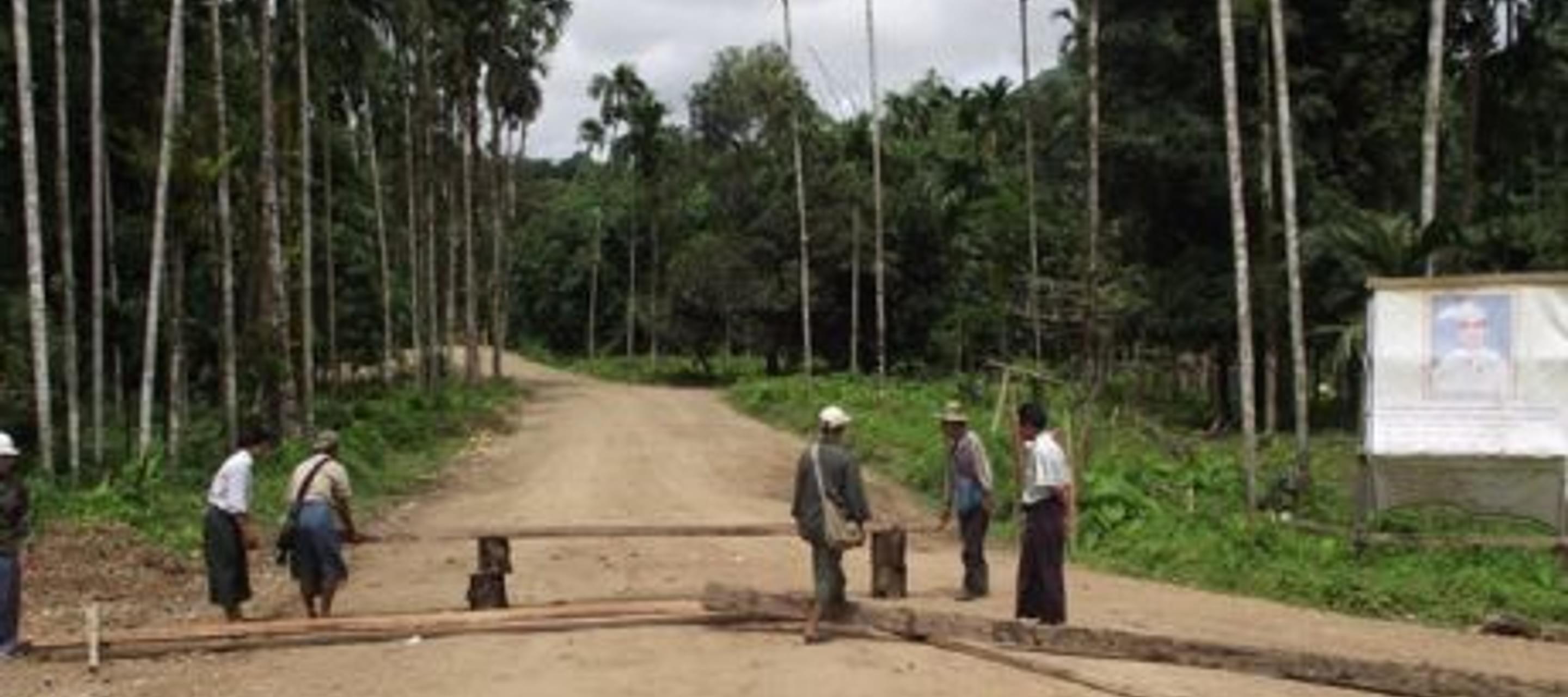Responsible Business in Myanmar: Getting down to the grassroots?
30 September 2013

Protests against large industry projects are becoming common in Myanmar. This month villagers are protesting against a Thai company’s inadequate compensation measures for the land it acquired during the 2010 construction of a road to Dawei in southeastern Myanmar.
Not far away in Yinboat village near Dawei, 300 locals due to be relocated gathered with monks to peacefully protest against the building of an oil refinery project, voicing worries of oil spills and waste. The project is a joint venture between the Chinese company Guangdong Zhenrong Energy Co Ltd (GDZR), the military-owned Union of Myanmar Economic Holdings Limited (UMEHL) and the Htoo Group of Companies, which is owned by US sanctions listed ‘crony’ Tayza.
Such incidents act as a reminder of the importance of businesses building a direct and close relationship from an early stage with communities they will impact.
The villagers on the Dawei road report that the compensation process was unfair and non-transparent, and that the road construction destroyed their cash crops, including rubber, cashew nut, and betel nut plantations. They also say the company, Italian Thai Development (ItalThai), has yet to compensate dozens of families for losses, and that water sources had been polluted during construction. On 9 September, villagers began to block ItalThai trucks carrying supplies and workers from travelling on the road.
Two years on, Myanmar’s far-reaching reform process has been met with strong interest from both Asian and Western companies seeking to invest there. In 2012 the Myanmar government enacted a Foreign Investment Law and is attempting to tackle tough issues such as corruption. However, since reform began, land disputes involving both foreign and domestic companies have been widely reported, as the government has eased restrictions on freedom of expression, and widespread protests over land have emerged across the country. Many of these disputes involve projects initiated under the previous military government, the legacy of an era characterized by a lack of transparency and accountability on the part of both companies needing land and the way the authorities enabled such acquisitions.
Other disputes between communities and companies in Myanmar could perhaps have been averted by a closer connection between company and community. Two in particular have hit the international headlines. The Letpadaung Copper project near Monywa, Sagaing Region, has been beset by ongoing protests by local villagers about unfair compensation for their land; lack of jobs for locals as the mine expanded; reports of pollution by mining activity and a connected military owned sulphuric acid factory; and violent tactics by the security forces in suppressing peaceful demonstrations. And after a nationwide campaign against the construction by a Chinese company of the Myitsone Dam on the Ayeyarwady (Irrawaddy) River in Kachin State, Myanmar’s President U Thein Sein took the unprecedented step of suspending the project in September 2011. The environmental impact assessment, which focused on biological and physical impacts, flagged up to the company the need to also conduct a social impact assessment, highlighting the widespread local opposition to Myitsone dam. But the company chose to ignore the red light and pressed ahead, with expensive consequences.
A number of companies in Myanmar who are facing these protests, as well as government officials, like to claim – publicly or privately - that they are doing their best to help the community, but that the protests are being orchestrated by ‘activists’ who are stirring up the community, and generating opposition to projects where none existed previously, ‘for political reasons’ or to increase compensation packages.
It is both true, and welcome, that with the opening up of political space in Myanmar, human rights defenders are increasingly able to work at the grassroots level where once they or their colleagues could only protest from a distance in Thailand. They are definitely playing a role in helping some community members – who may or may not be in the majority - to demand that their human rights be respected, for example to livelihoods, health, security and respect for their cultural beliefs. But equally, many of the active protesters have their roots in the community. Part of the problem is that local government officials are disempowered and stuck in the controlling habits of the last six decades, while not all community activists have the experience and knowledge to engage constructively with government. Civil society strengthening programmes in this area are important, and a number are underway.
And where outrage explodes, particularly if the company or the security forces respond with excessive force as happened in Letpadaung when the police fired phosphorus shells at unarmed protesters and monks, those protests will gather more support from further afield. Protesters may reject proposals to ameliorate negative impacts, and simply demand the project stops. This is true of the Myitsone dam, where public opinion appears to remain strongly opposed to Chinese calls to restart the project. Although Wanbao Mining’s new contract significantly increases community benefits, and some local villagers have accepted the enhanced compensation for the Letpadaung mine, others have not and may never do so. Naw Ohn Hla, a Yangon-based activist was recently jailed for two years for her demonstrations calling for its closure.
As in all countries, not everyone wants a pipeline, a mine or a road across their property. Such projects rarely if ever achieve 100% support. There will always be those who oppose it. But they will be far more numerous if the company has failed to engage with the community and failed to take steps to avoid negative impacts to the greatest extent possible and where avoidance is not possible, to minimise and mitigate its impacts. A company’s best insurance against widespread protests is to be in direct, early and continuous contact with the communities they impact so that members of the community trust the company as much as those offering them help to fight for their rights.
A frequent mistake companies have made in Myanmar in the past, particularly those coming from countries where civil society is weak, is to rely only on the government and local officials when seeking their license to operate. After sixty years of authoritarian rule, trust in the Myanmar government by the general population is exceptionally low, particularly in ethnic minority areas. Furthermore, weak administration, corruption and lack of rule of law means neither governments at national or regional level can always be considered as the sole source of reliable, locally sensitive, information, or as a channel to represent community views, or correctly deliver compensation.
To avoid blockades, protests, and increased costs, companies therefore need to build direct and early links with the communities they will impact. They need to work with them to understand their fears and concerns, prevent and mitigate as far as possible any negative impacts, and maximize the local economic and development benefits their operations can bring. If there is no other feasible alternative, they also need to take steps to provide alternative appropriate land as compensation where possible when displacing communities whose livelihoods are land-based and where cash compensation is not the best alternative, to ensure the full amount of compensation reaches those for whom it is intended, and that the recipients have the capacity to manage such a large cash injection in a way that allows them to maintain their livelihoods.
The newly established Myanmar Centre for Responsible Business (MCRB) in Yangon, a joint Institute for Human Rights and Business and Danish Institute for Human Rights initiative, seeks to assist companies in these efforts. MCRB is embarking on four sector-wide impact assessments of key industry sectors in Myanmar: oil and gas; tourism; ICT; and agriculture. These studies will look at potential nationwide impacts of each sector, and the assessments will be publicly available to help businesses, the government, and civil society in Myanmar to understand such effects. The assessments will examine the legal and policy frameworks for each sector and make detailed recommendations to inform companies’ thinking when they conduct their own impact assessments of projects they are undertaking there.
The need for such impact assessments and follow-up is particularly important in Myanmar, where rule of law is still weak, and where the land acquisition process is complicated and often unclear. Not only should companies engage with communities on an ongoing basis, they should also make every effort to ascertain population and other baselines, and the history of land tenure before they acquire such land for their operations. Moreover, they should put in place a transparent, equitable and accessible grievance mechanism so that communities can register any complaints related to the project. Such a mechanism is not meant to substitute the country’s legal structure, but offer a way for a company to address a community’s concerns as early as possible, before the situation worsens and grievances escalate.
Taking such steps is not only good for the communities, it is also good for sustainable business.



